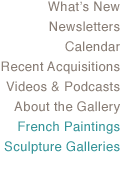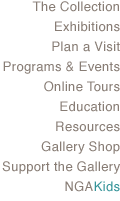| S | M | T | W | T | F | S |
|---|---|---|---|---|---|---|
| 26 | 27 | 28 | 29 | 30 | 1 | 2 |
| 3 | 4 | 5 | 6 | 7 | 8 | 9 |
| 10 | 11 | 12 | 13 | 14 | 15 | 16 |
| 17 | 18 | 19 | 20 | 21 | 22 | 23 |
| 24 | 25 | 26 | 27 | 28 | 29 | 30 |
| 31 | 1 | 2 | 3 | 4 | 5 | 6 |
Events will be added as they are scheduled. Please check back regularly for the most up-to-date calendar of events information.
Talks, Tours, Films
Audio ToursGallery Talks
Guided Tours
Film Programs
Lectures
Exhibitions
Current ExhibitionsMusic
ConcertsJazz Programs
Children's Programs
Family ActivitiesChildren's Films
School Tours
An ongoing program of classic cinema, documentary, avant-garde, and area premieres occurs each weekend in the East Building Auditorium, 4th Street at Pennsylvania Avenue NW. Programs are free of charge but seating is on a first-come, first-seated basis. Doors open approximately 30 minutes before each show. Programs are subject to change.
The current quarterly Film Calendar is also available in PDF format (Download Acrobat Reader). Call (202) 842-6799 for recorded information or contact us by e-mail at film-department@nga.gov to add your name to the mailing list.
Please see our accessibility page for information on services for the hearing impaired. Frequently Asked Questions: Auditorium Programs
Subscribe to Our Free E-mail Newsletters
Stay up to date with the National Gallery of Art by subscribing to our free e-mail newsletters: CASVA, educators, exhibitions, family programs, fellowships/internships, films, gallery talks/lectures, music programs, teen programs, and Web. Select as many updates as you wish to receive. To edit your subscriber information, please go to our subscription
management page.
In association with the exhibition Looking In: Robert Frank's "The Americans," this series brings together a variety of moving image works. It includes eight of Robert Frank's recent films, three documentaries on the artist completed at different points in his career, and a program titled "For Robert," consisting of works inspired by Frank's films and photography.
Anthology Film Archives, the New York film museum dedicated to the independent and avant-garde, was established in 1969. Jonas Mekas, Jerome Hill, P. Adams Sitney, Peter Kubelka, and Stan Brakhage were among the founders. Now known around the world for its collections and exhibitions, Anthology created the Independent Film Preservation program in the early 1970s to save works by 20th-century American experimental filmmakers such as Joseph Cornell, Maya Deren, Bruce Baillie, Jordan Belson, Paul Sharits, Stan Brakhage, and Harry Smith, to name only a few. This series samples some recent preservation by Anthology and was organized in association with archivist Andrew Lampert.
The Flaherty Seminar, an annual forum for critics, students, academics, and filmmakers focusing each year on a particular topic and held in upstate New York, is unique in American film culture. Screenings and discussions occur over an intense six days. Named for American maverick filmmaker Robert Flaherty and now in its 54th year, the most recent Flaherty was devoted to "The Age of Migration." The National Gallery salutes this unique program with a selection of films from the latest seminar.
Magnum photographer and distinguished photojournalist Raymond Depardon (b. 1942) spent a decade documenting rural life in France's Rhone region near Villefranche-sur-Saône. A native of the area, Depardon was familiar with its history and folkways. His resulting trilogy reflects with remarkable sensitivity the current conditions for local farm residents as well as the depth of his own rural roots.
Three recent examples of film as personal narrative illustrate the vitality and variety of this genre. As with writing, the filming of personal history should cause the viewer "to feel secure that the [filmmaker] has done his or her introspective homework, and is trying to provide the maximum understanding and intelligence of which he or she is capable."—Phillip Lopate, The Art of the Personal Essay
The director of the documentary department at Prague's legendary FAMU (film school of the Academy of Performing Arts), Karel Vachek has created one of the most original bodies of work in the history of Czech cinema. His film novels—enormous in scope, ambition, and duration—are improvisational and intuitive but also highly structured and philosophical. Handheld cameras relentlessly prowl, eavesdropping on politicians at ribbon cuttings and plunging headlong into heated discussions. They record the absurdities at ceremonies even as the voluble director acts as agent provocateur in his own interviews with seers, pundits, crackpots, and passersby. Following 20 years of manual labor from 1968 on, Vachek returned to film in the wake of the Velvet Revolution and proceeded to produce this enormous four-part kaleidoscope of the Czech Republic, post-freedom. Produced by Radim Procházka Productions with the support of The Czech Republic State Fund for Support and Development of Cinematography. The series is organized by Irena Kovarova.
From its beginnings in the late 19th century, the cinema has relied on color to carry its message. Dozens of technical processes have, with varying degrees of success, enhanced the viewer's experience. While black-and-white has its place in cinematic history, the conventions of color—yellow for outdoors, purple for early evening, blue for the sea, amber for fire, and so on—have been a constant. This series includes three illustrated talks on the attributes, technologies, and transformations of color during the first half of the 20th century as well as a selection of examples.
April 11 at 1:00PM
Highlights of the renowned Montreal International Festival of Films on Art, currently in its 27th year, are screened in two installments.
On Saturday, April 4, Ellsworth Kelly: Fragments, a study of the artist's life in Paris (Edgar B. Howard and Tom Piper, 2007, 67 minutes), is followed by Achieving the Unachievable, on M. C. Escher and number theorist Hendrik Lenstra (Jean Bergeron, 2007, 52 minutes); Andy Warhol: Denied, a look at the inner workings of the Warhol Art Authentication Board (Chris Rodley, 2006, 52 minutes); and Looking for an Icon, on photographs that attain time-honored status (Hans Pool and Maaik Krijgsman, 2007, 55 minutes).
On Saturday, April 11, Eileen Gray—Invitation to a Voyage looks at the career of this innovative and influential 20th-century designer (Jörg Bundschuh, 2006, 52 minutes), and Jimmy Rosenberg, the Father, the Son, and the Talent follows the life of the virtuoso guitarist known as "the new Django Reinhardt" (Jeroen Berkvens, 2006, 78 minutes).
From Giotto to Pasolini: Narrative Pictures in Fresco and Film
followed by Accattone
Art historian David Gariff discusses the life of Pier Paolo Pasolini (1922–1975) and his use of Italian medieval and Renaissance painting in his work. "What I see in my mind," said Pasolini, "are the frescoes of Giotto and Masaccio. I cannot conceive any [film] image, landscape, or composition outside the 14th century."
With its neorealist details, colorful lowlife characters, Bach's St. Matthew Passion on the music track, and Franco Citti's unadorned performance as Vittorio, Accattone—Pasolini's first feature—turns into a giant cinematic fresco. (Pier Paolo Pasolini, 1961, 35 mm transfer to digital beta, Italian with subtitles, 120 minutes)
Introduction by Scott MacDonald
Iconoclastic creator of found-object assemblages and counterculture-induced 16 mm shorts, Bruce Conner (1933–2008) left a legacy that inspired the international art world for five decades. With a "capacity to tie together the most disparate of media and ideas" (Bruce Jenkins), he became a collaborator with David Byrne and Brian Eno; he also anticipated the music video. This program, organized in association with the Conner Family Trust, is introduced by film historian Scott MacDonald. Screened in original 16 mm format, the program includes Valse Triste (1979, 5 minutes), A Movie (1958, 12 minutes), Breakaway (1966, 5 minutes), America Is Waiting (1982, 4 minutes), Marilyn Times Five (1973, 14 minutes), Easter Morning (2008, 10 minutes), and others. Special thanks to Jean Conner and Michelle Silva. (approximately 90 minutes total)
Avant-garde filmmaker James Benning has been recording his chronicles of the American landscape for forty years. RR, his new ode to freight trains and the vast terrain they traverse, is destined to be his final film in the handmade 16 mm format. Writes Jonathan Rosenbaum, "After one viewing, I feel I’ve barely scratched the surface of what seems somehow part of American literature–akin to the work of writers like Carl Sandburg, Thornton Wilder, and John Dos Passos as well as that of American painters and musicians." (James Benning, 2008, 16 mm, 110 minutes)
Hunky Blues—The American Dream
Péter Forgács in person
Washington premiere
Erasmus Award recipient Péter Forgács' latest film interprets the lives of ordinary Hungarians who arrived in the United States in the early 20th century. Reconstructing their history from evocative reels of home-movie footage and forgotten audio recordings, Forgács creates poetry from these implausible sources. Following the screening, he will discuss his film. Presented in association with the Hungarian Cultural Center and Extremely Hungary, a celebration of the country's contemporary arts and their impact on American culture. (Péter Forgács, 2009, HD-Cam, 75 minutes)
A formerly well-off French banker resorts to finding wealthy women to marry and then murders them for their money. At first mocked by critics and movie-goers alike, Monsieur Verdoux has come into its own as one of the great black comedies of the twentieth century. "As savagely funny as anything since Ben Jonson's Volpone"—Gerald Mast. (Charles Chaplin, 1947, 35 mm, 124 minutes)
Washington premiere
With a color scheme akin to the palette of the Macchiaioli painters treasured by the composer and with minimal dialogue to mimic the cinema of the period, Puccini and the Girl re-creates a little-known episode from Giacomo Puccini's life—ultimately a resource for his opera La fanciulla del west. (Paolo Benvenuti and Paola Baroni, 2008, 35 mm, Italian with subtitles, 84 minutes)
Washington premiere
Early cinema's intriguing and still undetermined relationship to the invention of cubism in Paris is the subject of a new documentary. Contrasting film clips and photographs with paintings to gauge the possible contact between cubism's inventors and the new movies, various artists, filmmakers, archivists, and historians offer their theories on a long-overlooked link. (Arne Glimcher, 2008, HD-Cam, 60 minutes)
followed by My Father's Studio
James Beveridge—documentary filmmaker extraordinaire and a cofounder of the National Film Board of Canada—was hardly known at all to his daughter Nina. The Idealist is Nina's effort to claim her father's legacy and to capture the true flavor of his remarkable life. (Nina Beveridge, 2004, digital beta, 76 minutes)
In My Father's Studio, Montreal filmmaker Jennifer Alleyn inherits her father Edmund Alleyn's painting studio. Finding herself drawn more and more into the private space of his art, she makes this film to fathom her father's psyche. (Jennifer Alleyn, 2008, digital beta, 70 minutes)






